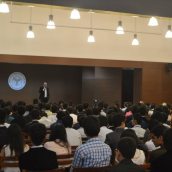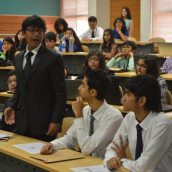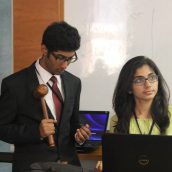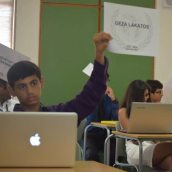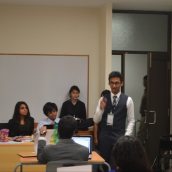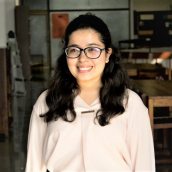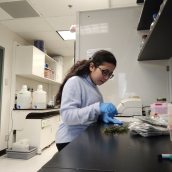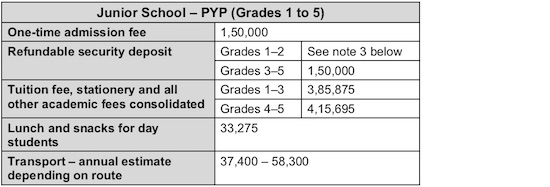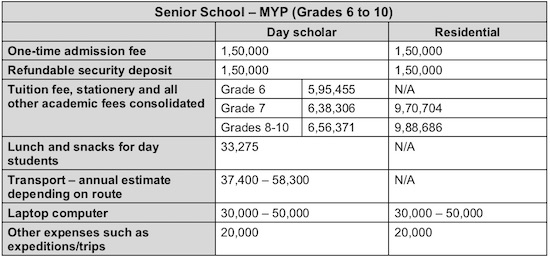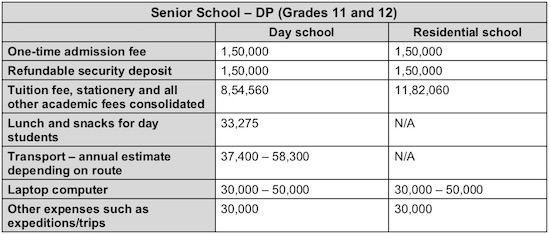The Aga Khan Academy Dhaka
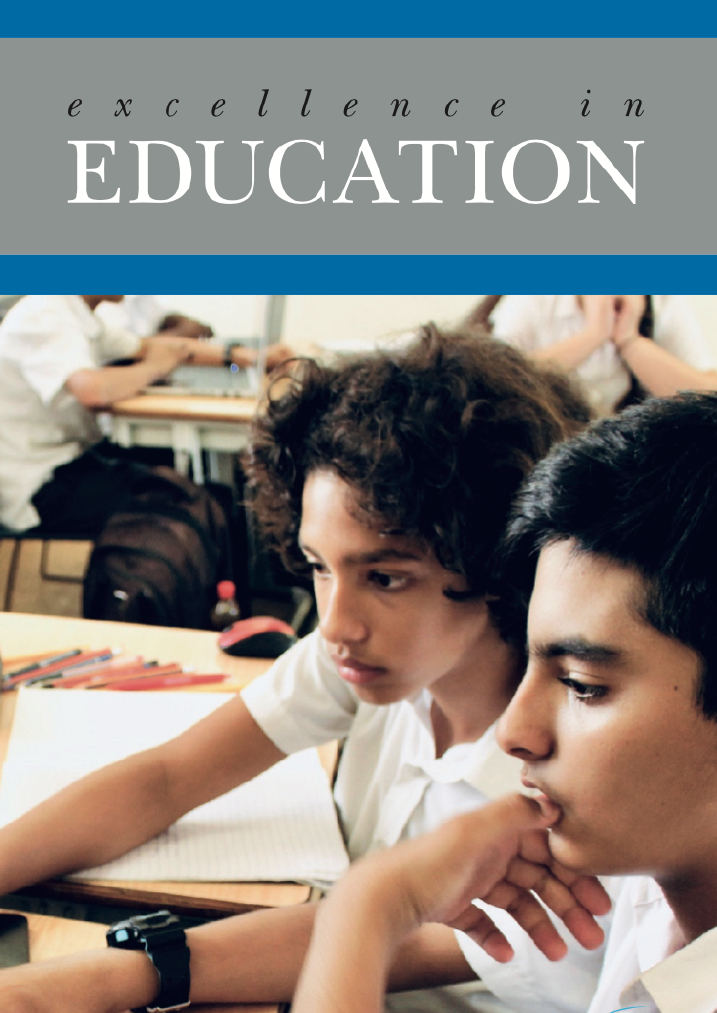
Aga Khan Schools Annual Publication 2021

AKA Maputo Quick Facts Sheet (ENG and PT)
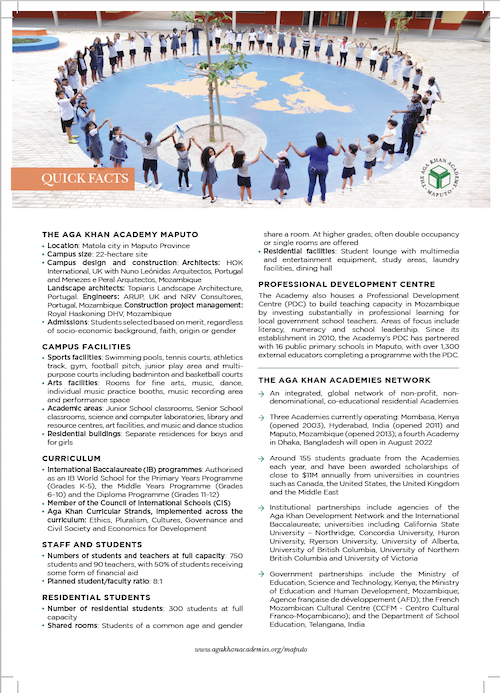
AKA Hyderabad IB School Profile 2022-2023
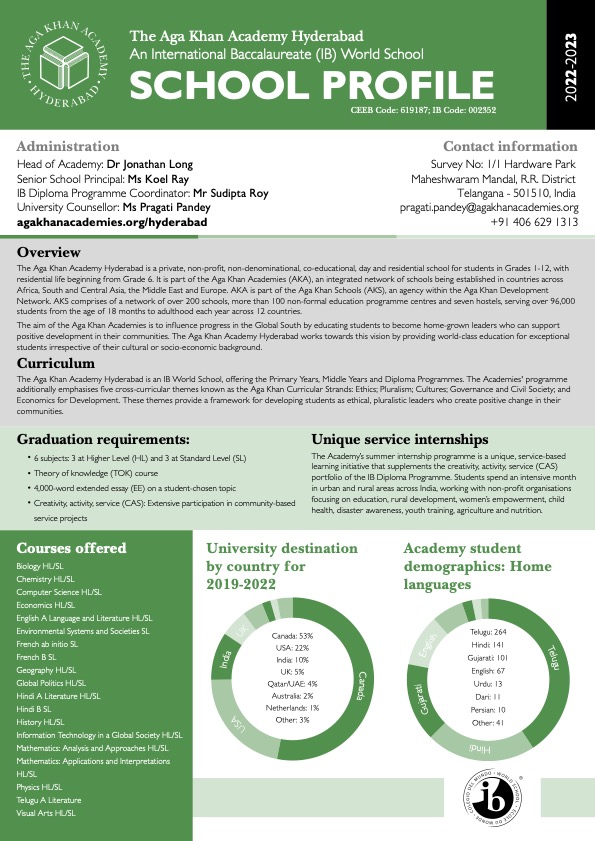
AKA Mombasa IB School Profile 2022-2023
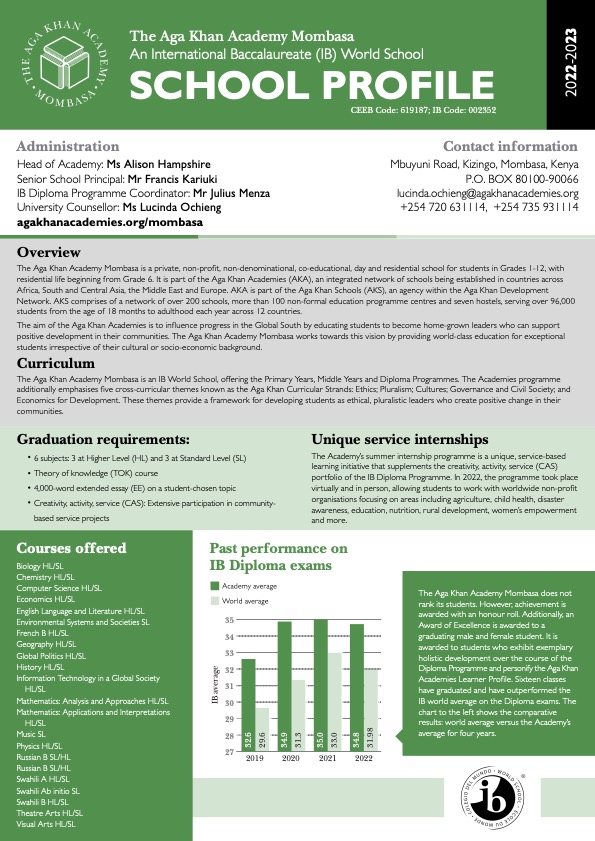
Aga Khan Schools University Counselling Handbook 2023-2024
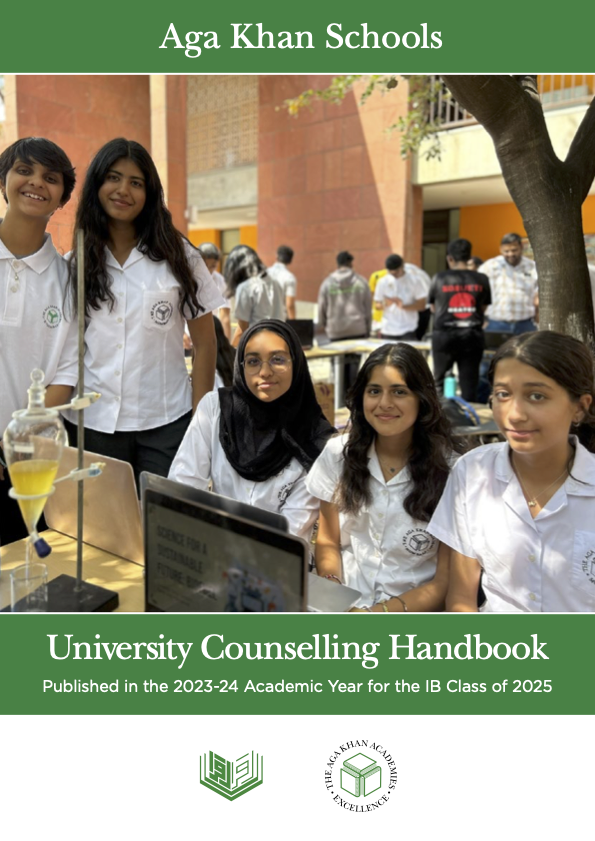
The MUN Press Corps
Reporters and photographers were on their feet at all times, running to capture a crisis update, to jotting down the points. As director, chasing them to do their work was a bit tedious, being left with a sea of words to look over. At the end of the day, the array of words and pictures will keep the memories of the Aga Khan Academy, Hyderabad Models United Nations alive for years to come.
By Nikita Madhani
Rising Beyond: Inspiring Debate at the MUN
The simulation opened with an aesthetic dance performance showcasing culture that exists in great depth, as well as having Birad Yajnik speaking about global citizenship and leadership. The opening ceremony was followed by the first session of this simulation which consisted of students prepared for heavy debate.
The first session was preliminary and introduced the agendas and topics of debate of each committee to all the delegates. DISEC (Disarmament and International Security Committee) was engaged in debating over the international intervention in Civil Wars; ECOSOC (Economic and Social Council) debated over the impact of science, innovation and technology in achieving the millennium development goals; the JCC (Joint Crisis Committee) went back into history and debated over issues concerning World War II; and lastly, we had the Press Corps which interacted with each committee and their delegates of the conference, and got intensely rooted in the simulation, in order to provide for a very holistic experience of the whole event that took place.The second day still carried on with the same passion and enthusiasm. The second session started off with a morning crisis update, which proved to be quite a surprise to all the delegates. However, the debates in each committee over the crisis initiated slowly, and later escalated into deeper and effective discussions. The Press were involved in initiating Crisis in each committee which proved to be operative as it provoked heavy debates and discussions, further on the day. The second day proved to be an ecstatic and progressive one as it stimulated every mind, which resulted in exciting preparations for resolutions for the last day. The Delegate Dance was of course one of the highlights of the second day of the simulation.
Eventually came the final day of the simulation. The day proved to be brief but tense as delegates of each committee had to come up with effective resolutions according to their agendas. Every committee except for JCC (as it was historical) and DISEC succeeded in coming up with resolutions. Although DISEC failed to pass a resolution, it still instilled the sense of intrigue, passion and enthusiasm to overcome problems that are faced on the surface of the planet – each day and every moment.After having come up with a variety of resolutions, the time for closing the simulation had come. This time was much awaited by the delegates as it was also an award ceremony. Titles such as “Best Delegate”, “Outstanding Delegate”, “Best Photographer” and “Best Reporter” echoed the halls of the venue wherein the ceremony took place. After having a hearing of speeches of inspiration and accomplishment by the Security General and the Executive Board, as well as teachers and staff who functioned as a backbone to the simulation; and watching proud delegates walking towards their much deserving awards, came the time of saying a proud goodbye to the Aga Khan Academy, Hyderabad’s second edition of the Model United Nations conference. Now awaits the third edition which shall happen in Fall, 2015.
By Akanksha Dev
Sarah Keshvani (Class of 2018): using biology to tackle environmental challenges
Sarah’s love for the sciences flourished during the Diploma Programme (DP) at the Academy in Hyderabad. Through her extended essay, she found the opportunity to learn more about how biology can provide solutions to modern challenges faced in local communities. She decided to tackle the issue of water shortages and soil nutrient deficiencies hindering large scale rice cultivation in the state of Telangana, leading to reduced crop yields. Due to zinc deficiencies in the soil, farmers resort to using huge amounts of fertilisers, which further degrade soil quality.
Sarah’s research centred on hydroponics as a possible solution to this problem. Plants are grown in water-based, nutrient solutions instead of soil.
“This technique has recently garnered a lot of attention because experiments have shown that growth is more than doubled when compared to traditional methods of agriculture,” Sarah explained. “Nutrient uptake is more efficient, and farmers can control the type of nutrients the plant is exposed to, in order to enhance different features of the yield. The use of water in hydroponics is still much more efficient than how it is used in open paddy fields that need to be covered in water during certain times of the crop cycle.”
Sarah’s conclusions were positive. Rapid growth was observed and the flexibility to control the nutrient uptake played a huge role in optimal plant health. She realised that a closed system would have provided more accurate results, as the higher evaporation rates disturbed the pH levels. Overall though, she deduced this technique could definitely tackle the challenges faced by paddy farmers.
“The IB curriculum followed at the Academy has played a pivotal role in building many essential skills for university life,” Sarah reflected when asked how she has settled into this new phase. “The emphasis on academic integrity and independence have served me really well here. I was taught to think critically rather than blindly follow textbooks. Its skill-based learning approach, and connecting classroom learning to the real world, also prepared me well for higher education.”
Fee schedule test
Fee schedule for the 2018-2019 academic year.
![]() Aga Khan Academy Hyderabad Fee Schedule - 2018-19.pdf
Aga Khan Academy Hyderabad Fee Schedule - 2018-19.pdf
Notes
1 A one-time non-refundable admission fee is payable for students enrolling for the first time. The admission fee must be paid to secure the place for a child at the Academy. This cannot be deferred or paid in instalments. The due date is one week after the offer has been accepted.
2 A one-time refundable security deposit is also payable on acceptance of admission and should be paid together with the admission fee mentioned above. It is refundable when a student leaves the Academy as long as the required notice has been given in writing and “No Dues” clearance is obtained from the Academy. No interest is payable on this deposit.
3 Grade 1 & 2 students will have option to pay refundable security deposit in two instalments. First instalment of Rs. 75,000 when they enter grade 3/4 and second instalment when they enter grade 5/6.
4 A sibling discount on tuition fees of 15% will be applicable for second and subsequent children.
5 Tuition fees for the academic year may be paid in full with an early-payment discount of 3% on or before 31 July. This discount is applicable on the net amount payable after other discounts have been deducted.
6 Tuition fees are payable in two equal instalments, no later than 31st July and 15th December of each academic year. For DP2 (grade 12) students the due date for the second instalment is 15th November.
7 For new admissions to an academic year the tuition fees must be paid within 30 days of admission to secure a place at the Academy.
8 The Academy will charge a monthly sur-charge of 2% on the total outstanding dues older than 30 days. In case the fees are not paid within one month’s period following the deadline, the student will not be allowed to attend classes or participate in other activities undertaken by the Academy.
9 Tuition fees include course fees, use of essential course books, library books, IT and science laboratory equipment and certain classroom supplies. The fees do not include uniform costs.
10 Exam fees for IB Middle Years Programme and the Diploma Programme will be billed separately based on the actual fee issued by the International Baccalaureate Organization (IBO).
11 Parents of returning students will be invoiced four to six weeks prior to the new academic year.
12 The Academy no longer accepts cash for fee payments. All payments must be made by direct bank deposit, bank transfer, cheque or demand draft even if the payment is being made by a third party such as a sponsoring organization. Parents must provide the finance office (finance@agakhanacademies.org), with a hard or an electronic copy of proof of payment showing the full name of the student and the student identification number within 15 days of fund transfer for issuance of payment receipt. Absence of this information may delay crediting the fees reflected on your account in our system.
13 Parents are responsible for ensuring that the fee payments are made into the correct bank account of the Academy. In the unlikely event of any change in bank account details, the changes will be communicated to parents in writing via a hand delivered letter from the Academy.
14 If a student wishes to leave the Academy, one term’s advance notice of withdrawal must be given in writing or one term’s worth of the annual fees will be due and payable. School clearance will not be possible until any outstanding dues are settled in full.
15 The Academy reserves the right to withhold results, school certificates, transcripts or any other information and/or documents until all outstanding dues are settled in full.
16 Admitted students, who demonstrate financial need and duly fill in and submit the application along with required supporting documents within the stipulated time, can be considered for financial aid. An independent financial aid committee is responsible for reviewing and approving any request for financial aid by students.
17 The above terms and conditions may be modified or new terms may apply to reflect changes in the law or our services. For further information, please contact us at admissions.hyderabad@agakhanacademies.org.
18 Please note that fee structures are subject to annual review.
